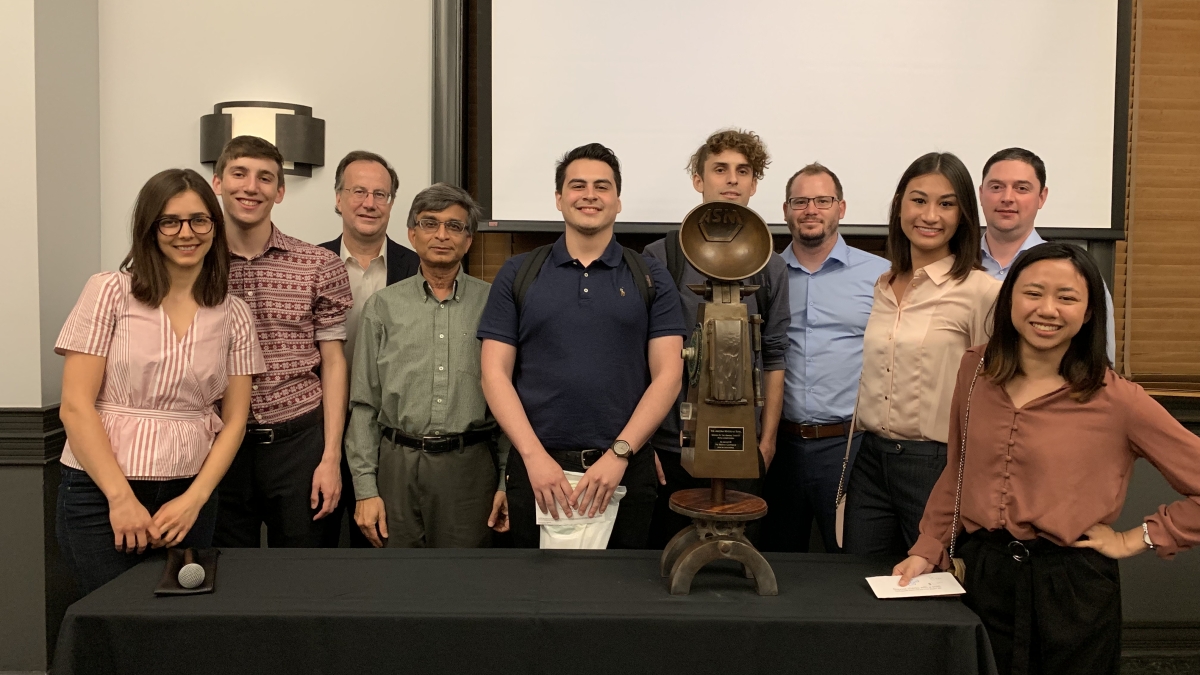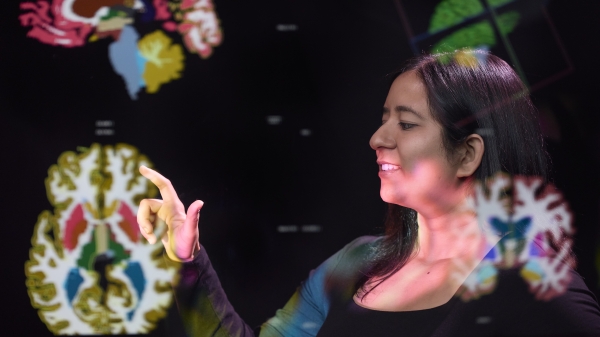ASU sweeps the podium at 2019 Materials Bowl

Members of the winning teams and mentors (from left: Pranvera Kolari, Benjamin Shindel, President’s Professor James Adams, Senior Research Specialist Shahriar Anwar, Austin Bennett, Brandon Houck, Andrew Black, Samantha Hom, Devin Hardy and Ariana Tse) pose with the Materials Territorial Trophy after winning the three top prizes at the 2019 Materials Bowl. Photograph courtesy of Shahriar Anwar
Ten teams from Arizona State University’s Ira A. Fulton Schools of Engineering competed against five teams from the University of Arizona Department of Materials Science and Engineering in the 16th annual Materials Bowl in Tempe, Arizona.
The Materials Bowl is a senior capstone project and poster competition for Arizona materials science and engineering students sponsored by the ASM International Phoenix Chapter in which a jury of four industry professionals award the three top-ranked projects. The winning team receives the Materials Territorial Trophy.
Teams of two to five students gave presentations to a panel of judges and were critiqued based on the quality of their projects and presentations.
“In the materials science and engineering capstone course we strive to give the students as much real-life experience as possible,” said Shahriar Anwar, a senior research specialist in the School for Engineering of Matter, Transport and Energy.
This year, ASU teams took the top three prizes. The first-place team included Andrew Black, Devin Hardy, Samantha Hom and Ariana Tse. They took home the top prize of $1,000 and claimed the Materials Territorial Trophy for their project, “Redesigning Heat Treatment of Additively Manufactured AM355.”
In the project mentored by Honeywell, the team designed a heat treatment for additively manufactured AM355 stainless steel, which is used in the aerospace industry. They reduced processing time and costs while maintaining the material’s desired properties. The team achieved roughly 20% increased tensile strength (increased ability to be pulled apart without breaking) while reducing costs by 20% and direct treatment time by 50%.
The team of Austin Bennett and Brandon Houck earned the second-place prize of $700. Their project was titled “Design and Process Development of Natural Fiber Reinforced Bio-Composites.”
The duo developed a method of generating and testing a microbial harvested biocomposite that may be able to be used as a replacement for natural leather made from animal hide. They were able to achieve mechanical properties comparable to that of natural leather.
The third-place team featured Pranvera Kolari and Benjamin Shindel, who won a $300 prize for their project, “ConCreate: Design of an Additively Manufacturable and Sustainable Concrete Mix.”
The ConCreate team produced additively manufactured concrete that incorporated waste glass. The team claimed that their product would reduce both global carbon dioxide emissions and improve glass recycling while speeding up building construction using additive manufacturing techniques. The resulting product had similar mechanical properties to traditional concrete structures.
The Materials Bowl competition helps showcase the caliber of materials science and engineering students to members of the local industry.
“The competition between ASU and UA generates real excitement and a competitive mindset toward excelling and taking pride in their projects,” Anwar said. “The presentations are made in a formal atmosphere similar to that of a scientific conference and affords an opportunity to our students to present to a diverse audience from academia and industry.”
More Science and technology

New NIH-funded program will train ASU students for the future of AI-powered medicine
The medical sector is increasingly exploring the use of artificial intelligence, or AI, to make health care more affordable and…

Cosmic clues: Metal-poor regions unveil potential method for galaxy growth
For decades, astronomers have analyzed data from space and ground telescopes to learn more about galaxies in the universe.…

Indigenous geneticists build unprecedented research community at ASU
When Krystal Tsosie (Diné) was an undergraduate at Arizona State University, there were no Indigenous faculty she could look to…